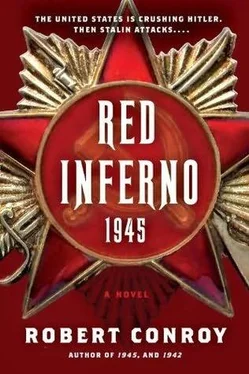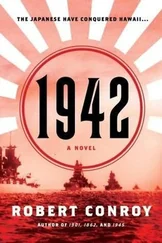Robert Conroy - Red Inferno
Здесь есть возможность читать онлайн «Robert Conroy - Red Inferno» весь текст электронной книги совершенно бесплатно (целиком полную версию без сокращений). В некоторых случаях можно слушать аудио, скачать через торрент в формате fb2 и присутствует краткое содержание. Жанр: Альтернативная история, на английском языке. Описание произведения, (предисловие) а так же отзывы посетителей доступны на портале библиотеки ЛибКат.
- Название:Red Inferno
- Автор:
- Жанр:
- Год:неизвестен
- ISBN:нет данных
- Рейтинг книги:4 / 5. Голосов: 1
-
Избранное:Добавить в избранное
- Отзывы:
-
Ваша оценка:
- 80
- 1
- 2
- 3
- 4
- 5
Red Inferno: краткое содержание, описание и аннотация
Предлагаем к чтению аннотацию, описание, краткое содержание или предисловие (зависит от того, что написал сам автор книги «Red Inferno»). Если вы не нашли необходимую информацию о книге — напишите в комментариях, мы постараемся отыскать её.
Red Inferno — читать онлайн бесплатно полную книгу (весь текст) целиком
Ниже представлен текст книги, разбитый по страницам. Система сохранения места последней прочитанной страницы, позволяет с удобством читать онлайн бесплатно книгу «Red Inferno», без необходимости каждый раз заново искать на чём Вы остановились. Поставьте закладку, и сможете в любой момент перейти на страницу, на которой закончили чтение.
Интервал:
Закладка:
“Gentlemen, I have no weapons.”
“Then what the hell do you want?” snapped Leland.
“My name is Wolfgang von Schumann and I would like to talk to the general. I have several questions and some few suggestions in which I might be of assistance to you.”
“Where’d you lose the leg?” Miller asked. From his bearing, he had deduced that the man was likely a German officer.
“Stalingrad.”
“You’re a Nazi?” Miller continued.
“Yes. At least I was.”
Miller laughed grimly and Leland joined in. “Jesus Christ,” said Miller, “I knew there had to be at least one of you in Germany. Everybody we talk to says that they never were Nazis although all of their neighbors were. At least you’re somewhat of an honest man. Now, what were your questions?”
Wolfgang gestured behind him, where a number of disheveled civilians were gathered, watching him talk to the American general.
“Somehow, General Miller, I have become the leader of several hundred refugees, with more gathering by me each day. I help them collect and distribute food and clothing, and try to ensure that they have shelter until they can somehow find their way to their homes. I might add that not all the refugees are Germans. Some are forced laborers, while others are slave laborers from other countries who have been freed as a result of the upheavals around us. I even have a number of Jews who were in concentration camps and have managed to escape in the chaos.”
“Great,” Miller said. “I am sincerely glad that someone is taking care of them. Now, what was your question?”
“Since we are in your area of control and unable to leave, we will shortly be without resources. When that time comes, I have a simple question-will you feed us?”
Miller blinked. “Shit. What would happen if I asked you to leave?” he asked, thinking of the additional strain the growing number of refugees would put on his limited resources. And there had to be many more than the few hundred von Schumann was referring to.
Von Schumann gestured with his hands. “It would be the same as shooting us. In fact, shooting us would be a great favor. The Russians would kill every one of us, every man, woman, and child, regardless of age. The men might die quickly, but the women’s deaths would be lingering and horrible. And God only knows what they would do to the children.”
Miller was not surprised. He had been hearing stories of unbelievable atrocities committed by the Russians as reprisal for the barbarities inflicted upon their people by the Nazis. He had no love for the Germans, but neither did he want to be responsible for the deaths of civilians. Not directly, at least.
“All right,” he said grudgingly, “your people can stay and I will do my best to get you enough food and medical supplies. But your people get theirs after my boys go first.”
Even as he said it, Miller knew it was an empty statement. He had already seen GIs giving food to hungry German children, and the inevitable bartering system would start up shortly. He would have to issue a nonfraternization order and hope his troops paid at least some attention to it. A realist, he knew they probably wouldn’t.
“You said you had suggestions, von Schumann?”
“General, I believe a number of my civilians have skills that you can use during your unintended stay here in Potsdam. For instance, did you take any prisoners during the battle?”
Miller looked at Leland. “Half a dozen,” Leland responded, thinking angrily of the thousands of missing Americans.
“Have you interrogated them?”
“No,” Leland responded.
“And why not?”
“Because,” Leland snapped, “we don’t have a single fucking soul who speaks Russian. A couple of the Russian prisoners are too badly hurt to talk, but the others just sit there and smile at us and eat our food.”
Von Schumann smiled. “I know of several displaced workers in my flock who are from the Soviet Union. Russian is their native tongue and they have learned out of necessity to speak German. They will translate Russian to German and we have several people who speak English.”
Miller’s mind raced. He would dearly love to know what orders the few Russians he held had been given prior to the attack. The answers to that sort of question might end all that bullshit about the attack being a mistake.
“I’ll take your translators,” Miller said, “if they speak English as well as you do. Where did you learn it?”
Von Schumann laughed, something he hadn’t done much of lately. “Thank you, General, but in Europe it is virtually essential that an educated person be conversant in at least one language other than one’s own. I also speak French and can get by in Spanish.”
Miller cringed inwardly. The kraut was right. Everyone spoke more than one language in Europe. He sometimes considered himself barely adequate in English.
“General,” von Schumann continued, “I have a number of other people who can serve as medical assistants, cooks, laborers, and such to free your people from some of those tasks. I have been watching your soldiers dig trenches. Wouldn’t you like to have some of my people digging for you and earning their food?”
Von Schumann was offering a trade, and it was an easy decision to make. Food for labor while his men did the important work of preparing for battle. “Okay,” said Miller, surprising himself by holding out his hand to von Schumann. It just seemed the right thing to do. “You’re on.”
Miller hopped in the front seat of the jeep and gestured for von Schumann to get in behind him. “Von Schumann, when you were a Nazi up at Stalingrad, just what did you do there?”
“I commanded a Panzer unit. A brigade of tanks.”
“Against the Russians?” It was a foolish question, Miller realized. Who else would have been there?
“Certainly.”
“Von Schumann, I think we should have a long talk fairly shortly.”
Elisabeth had good days and bad days. Until earlier, she thought her life was getting better. Her body no longer ached very much and she was able to think clearly at least most of the time. Survival no longer seemed laughably impossible.
Lis had been fortunate. She had been spared much of the horrors of the siege of Berlin. She had lived in her late parents’ apartment on the outskirts and had to endure only a little of the bombing and, more recently, the incessant shelling from Red Army artillery had passed her by. Of course she’d gone to the air-raid shelter on many occasions, but most of the bombs had not fallen near her home. Several times, she’d looked skyward and seen the shapes of the hosts of bombers flying overhead. She understood the routine-the Americans bombed during the day and the British at night. Like everyone in Berlin, it was clearly evident that the city was defenseless. The Luftwaffe was nonexistent. She’d known some young men who’d been pilots and wondered if they still lived. Likely not, she thought.
On the radio, Propaganda Minister Joseph Goebbels told his shrinking world that the Allied bombers weren’t enough to frighten the German people. Well, Lis thought, they were certainly enough to frighten her. Even at a distance, the shock waves could be felt and the clouds and fire and smoke were clearly visible. Berlin was a city in agony and she could feel the pain.
She recalled seeing a painting of what an artist thought was Hell and concluded that the people in the center of Berlin were living there.
When an occasional bomb did land near her home, she immediately went to the site to help as much as she could. She was far from alone in that effort as her neighbors all pitched in to help out. Sometimes, however, it was futile, as the mangled bodies of the dead were pulled from the debris, or the screaming maimed and injured were loaded into improvised ambulances and driven to overcrowded and understaffed hospitals that also lacked even rudimentary supplies.
Читать дальшеИнтервал:
Закладка:
Похожие книги на «Red Inferno»
Представляем Вашему вниманию похожие книги на «Red Inferno» списком для выбора. Мы отобрали схожую по названию и смыслу литературу в надежде предоставить читателям больше вариантов отыскать новые, интересные, ещё непрочитанные произведения.
Обсуждение, отзывы о книге «Red Inferno» и просто собственные мнения читателей. Оставьте ваши комментарии, напишите, что Вы думаете о произведении, его смысле или главных героях. Укажите что конкретно понравилось, а что нет, и почему Вы так считаете.












